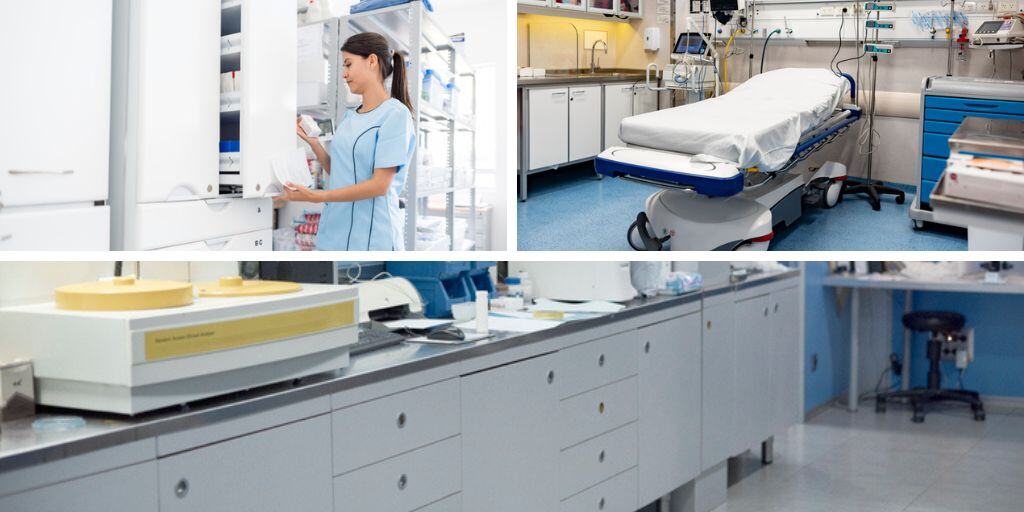The healthcare environment is constantly evolving, requiring facilities to adapt swiftly to new technologies, treatment methods, and patient needs. One area often overlooked in the evolution process is the casework—the cabinets, counters, and storage systems integral to medical environments. Converting to modular casework can offer significant benefits in terms of efficiency, cost savings, and adaptability. But what exactly is modular casework, and why should medical facilities consider this option?
In this post we will:
- Answer the question ‘What is Modular Casework?'
- Explore the Benefits of Modular Casework
- Answer Frequently Asked Questions about Modular Casework
What Is Modular Casework?
Modular casework refers to a type of storage and workspace system that is designed to be customizable and reconfigurable. Unlike traditional casework, which is often built directly into the medical or laboratory facility and becomes a permanent fixture, modular casework is composed of prefabricated units that can be easily assembled, disassembled, and reconfigured as needed.
Modular casework offers the flexibility that modern healthcare facilities and laboratories demand. Whether it is reconfiguring a space to better accommodate a new piece of equipment or expanding storage space to manage an influx of supplies, modular systems can be quickly and easily adjusted to meet the facility's needs.
Modular casework is built with adaptability in mind, giving medical facilities and labs the option to rearrange or expand their workspace without significant downtime or expense. In essence, future-proofing the facility.
Benefits of Modular Casework
The design and construction of modular casework offers several key features that make it an attractive option.
1. Flexibility and Customization: One of the most significant advantages of modular casework is its flexibility. Units can be customized to fit the exact needs of different departments within a medical facility. Whether it is specialized storage for surgical instruments or custom-sized countertops for lab work, modular casework can be tailored to meet specific requirements.2. Durability and Quality Materials: Modular casework is typically constructed from high-quality, durable materials that can withstand the demands of a medical environment. These materials are resistant to wear and tear and able to withstand frequent cleaning with harsh sterilization solutions, making them a long-lasting solution for healthcare facilities.
3. Easy Installation and Reconfiguration: The modular nature of this casework means that it can be installed quickly with minimal disruption to the facility’s operations. Moreover, reconfiguration is straightforward, allowing facilities to adapt their spaces as needed without the need for extensive renovations.
While flexibility, durability, and ease of installation top the list of benefits, the advantages of moving to modular casework extend beyond these three. Here are several more reasons to upgrade to modular casework.
4. Improved Workflow and Efficiency: Modular casework is designed to support better workflow in medical facilities. By providing customized storage solutions and workspace arrangements, staff can work more efficiently, reducing the time spent searching for supplies or navigating around poorly designed spaces.5. Space Optimization: Space is often at a premium in medical facilities. Modular casework allows for the optimal use of available space, with units that can be arranged to maximize storage and workspace without overcrowding.
6. Cost-Effectiveness: While the initial investment in modular casework might be higher than traditional options, the long-term savings are significant. Modular systems reduce the need for costly renovations and repairs and can be reconfigured or expanded at a fraction of the cost of traditional casework.
7. Sustainability and Environmental Impact: Many modular casework systems are made from eco-friendly materials, reducing the environmental impact of their production and use. These materials are often recyclable or made from recycled content, contributing to a facility’s overall sustainability.
8. Regulatory Compliance and Safety: With smooth, non-porous surfaces that resist bacteria, mold, and other pathogens, as well being constructed of materials with flame retardant properties, modular casework meets compliance and regulatory standards set by the Joint Commission, FDA, OSHA, and the National Fire Protection Association. Additionally, features such as recessed hinges, secure locking mechanisms, and soft closing drawers help protect clinicians, technicians, and patients from injury.
Finally, along with functionality benefits, modular casework also offers aesthetic advantages.
9. Modern and Professional Appearance: Modular casework contributes to a modern and professional appearance in medical facilities. This can have a positive impact on the overall environment, making it more welcoming for both patients and staff.10. Patient Perception and Comfort: The look and feel of a medical facility can play a significant role in patient outcome. A clean, well-organized space equipped with modern casework can help patients feel more comfortable and confident in the care they are receiving.
Converting to modular casework is a forward-thinking decision that can significantly improve the efficiency of medical facilities and laboratories. While the initial investment may be higher than traditional casework, the long-term benefits in terms of cost savings, adaptability, and patient satisfaction make it a wise choice for modern healthcare environments. By choosing modular casework, facilities can future-proof their spaces, ensuring they can adapt to the ever-changing demands of the healthcare industry.
Partner with CME for Modular Casework
As a nationally recognized healthcare equipment distributor and the only one focused solely on healthcare equipment, CME has built relationships with industry leading manufacturers of modular casework.
Our expert account managers will work with you and modular casework manufacturers’ representatives to help select and configure the casework that not only meets the facility’s current needs but also future-proofs storage options, while keeping an eye to the budget.
Complementing CME’s focus on healthcare equipment are logistics and direct-to-site delivery services.
In-house Logistics and Direct-To-Site delivery are additional services provided by CME. Our teams receive, inspect, uncrate, and deliver modular casework to the room of choice when it is conducive to the workflow of the facility.
If during the incoming inspection at our warehouse damaged or defective components of the casework are identified, logistics will work through our procurement project managers to resolve the issue with the manufacturer.
Partnering with CME, the only one-stop-shop healthcare equipment distributor, nationwide, for modular casework is a strategic choice that can contribute to ensuring medical and laboratory facilities are properly equipped with storage options and meet regulatory and safety standards for casework.
![]() Click CHAT to begin a conversation about your storage needs.
Click CHAT to begin a conversation about your storage needs.
Frequently Asked Questions
What is the lifespan of modular casework?
Modular casework is designed to be durable, often lasting 20 years or more with proper maintenance. Its adaptability also means it can evolve with the facility's needs, further extending its useful life.
Can modular casework be customized for different departments?
Yes, modular casework is highly customizable and can be tailored to meet the specific needs of different medical departments, from laboratories to patient care areas.
How does modular casework contribute to sustainability?
Modular casework often uses eco-friendly materials and generates less waste during construction and installation, making it a more sustainable choice compared to traditional casework.
What are the cost implications of switching to modular casework?
While the initial investment may be higher, modular casework offers long-term cost savings through reduced maintenance, repair costs, and the ability to reconfigure or expand without significant expense.
About CME: CME Corp is the nation’s premier source for healthcare equipment, turnkey logistics, and biomedical services, representing 2 million+ products from more than 2,000 manufacturers. With two corporate offices and 35+ service centers, our mission is to help healthcare facilities nationwide reduce the cost of the equipment they purchase, make their equipment specification, delivery, installation, and maintenance processes more efficient, and help them seamlessly launch, renovate and expand on schedule.



